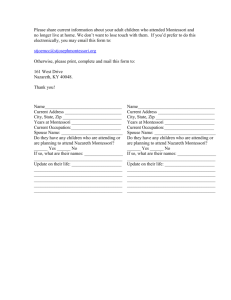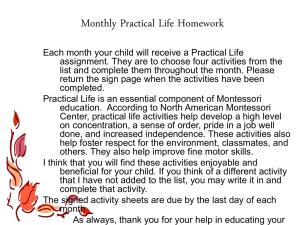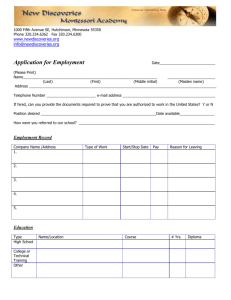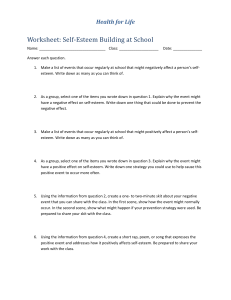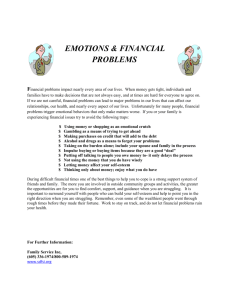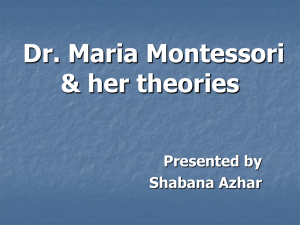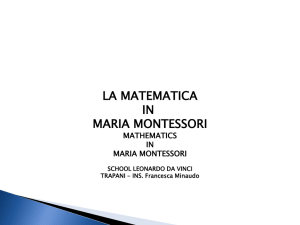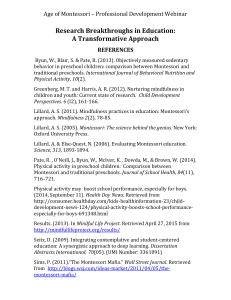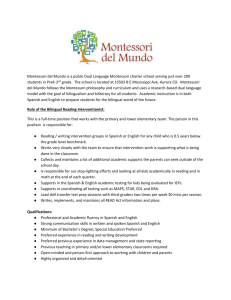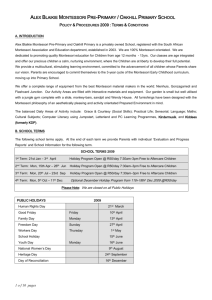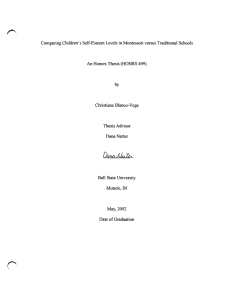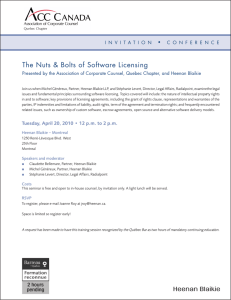Our Fundamental Values and Beliefs as a School
advertisement
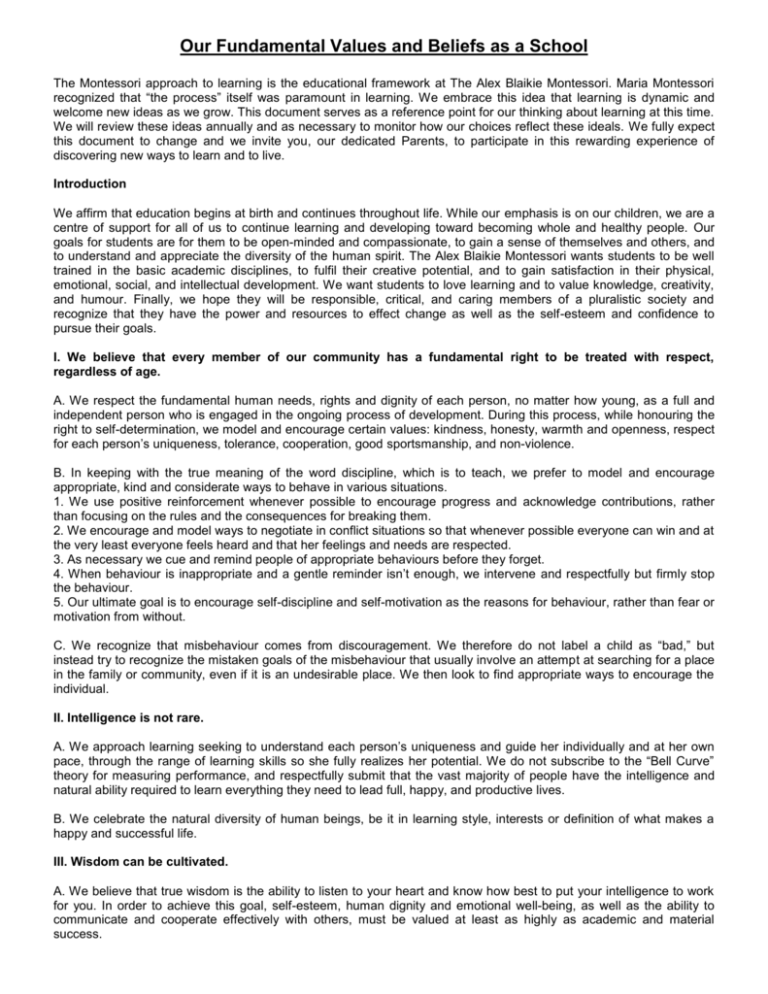
Our Fundamental Values and Beliefs as a School The Montessori approach to learning is the educational framework at The Alex Blaikie Montessori. Maria Montessori recognized that “the process” itself was paramount in learning. We embrace this idea that learning is dynamic and welcome new ideas as we grow. This document serves as a reference point for our thinking about learning at this time. We will review these ideas annually and as necessary to monitor how our choices reflect these ideals. We fully expect this document to change and we invite you, our dedicated Parents, to participate in this rewarding experience of discovering new ways to learn and to live. Introduction We affirm that education begins at birth and continues throughout life. While our emphasis is on our children, we are a centre of support for all of us to continue learning and developing toward becoming whole and healthy people. Our goals for students are for them to be open-minded and compassionate, to gain a sense of themselves and others, and to understand and appreciate the diversity of the human spirit. The Alex Blaikie Montessori wants students to be well trained in the basic academic disciplines, to fulfil their creative potential, and to gain satisfaction in their physical, emotional, social, and intellectual development. We want students to love learning and to value knowledge, creativity, and humour. Finally, we hope they will be responsible, critical, and caring members of a pluralistic society and recognize that they have the power and resources to effect change as well as the self-esteem and confidence to pursue their goals. I. We believe that every member of our community has a fundamental right to be treated with respect, regardless of age. A. We respect the fundamental human needs, rights and dignity of each person, no matter how young, as a full and independent person who is engaged in the ongoing process of development. During this process, while honouring the right to self-determination, we model and encourage certain values: kindness, honesty, warmth and openness, respect for each person’s uniqueness, tolerance, cooperation, good sportsmanship, and non-violence. B. In keeping with the true meaning of the word discipline, which is to teach, we prefer to model and encourage appropriate, kind and considerate ways to behave in various situations. 1. We use positive reinforcement whenever possible to encourage progress and acknowledge contributions, rather than focusing on the rules and the consequences for breaking them. 2. We encourage and model ways to negotiate in conflict situations so that whenever possible everyone can win and at the very least everyone feels heard and that her feelings and needs are respected. 3. As necessary we cue and remind people of appropriate behaviours before they forget. 4. When behaviour is inappropriate and a gentle reminder isn’t enough, we intervene and respectfully but firmly stop the behaviour. 5. Our ultimate goal is to encourage self-discipline and self-motivation as the reasons for behaviour, rather than fear or motivation from without. C. We recognize that misbehaviour comes from discouragement. We therefore do not label a child as “bad,” but instead try to recognize the mistaken goals of the misbehaviour that usually involve an attempt at searching for a place in the family or community, even if it is an undesirable place. We then look to find appropriate ways to encourage the individual. II. Intelligence is not rare. A. We approach learning seeking to understand each person’s uniqueness and guide her individually and at her own pace, through the range of learning skills so she fully realizes her potential. We do not subscribe to the “Bell Curve” theory for measuring performance, and respectfully submit that the vast majority of people have the intelligence and natural ability required to learn everything they need to lead full, happy, and productive lives. B. We celebrate the natural diversity of human beings, be it in learning style, interests or definition of what makes a happy and successful life. III. Wisdom can be cultivated. A. We believe that true wisdom is the ability to listen to your heart and know how best to put your intelligence to work for you. In order to achieve this goal, self-esteem, human dignity and emotional well-being, as well as the ability to communicate and cooperate effectively with others, must be valued at least as highly as academic and material success. B. We affirm the ideal of the renaissance person. Our ultimate goal is to produce renaissance men and women who have not only learned how to learn, but also have an innate love of learning, a wide range of interests and an openness to new ideas and possibilities. IV. Self-esteem is the crucial ingredient for the full expression of a person’s potential. A. Nurturing self-esteem: We strive to base every interaction between community members, from how we discipline to respecting personal learning styles and stages of development, on this principle. This is the very fabric of our community and our educational methods. B. Learning from experience: We consciously encourage our students to not be afraid of taking risks, but rather to use the countless positive and negative experiences that everyone inevitably has in a lifetime as non-threatening feedback on their progress and personal growth. C. Our expectations: In all cases we set our expectations high, not asking individuals to do more than they are capable of, but consistently stressing the importance of careful work and pride in accomplishment. The reward is not in a quantity of work achieved but the satisfaction of work done well for its own sake. We carefully build a supportive environment for the unhurried mind to move steadily toward the pursuit of excellence. D. Competition: We encourage the development of respect for natural abilities. While we allow children to experience failure by separating the deed from the doer in all things, from earliest times we seek to minimize any negative effect on self-esteem that failure or lack of natural ability in an area might have. We do not believe that it is either necessary or appropriate to inspire unrestrained academic pressure and scholastic competition among students. We cultivate the ability to accept success with grace, and failure or loss with dignity, and resolve to build on the experience. V. The development of a whole, healthful being requires the nurturing of our many dimensions, including the spiritual, intellectual, physical, and emotional. A. Spiritual: While we feel it is each person’s task to develop his or her own understanding of the nature of the universe and the individual’s place in it, we proceed on the premise that our world is a beautiful, positive, loving place, a setting that provides the potential for each person to lead a full, free, joyful and healthy life. B. Intellectual: The intellect is an important tool in the shaping of our world. Through the development of our thinking abilities we refine our emotional responses, we clarify our picture of the universe, and we develop the discipline to maintain vibrant health. C. Physical: Recognizing that the intellectual and emotional potential and capabilities of our brains are, like any other organ, dependent on a clean, healthful bloodstream, we acknowledge our place in the physical world and seek to discover, understand, and adopt the lifestyle habits most appropriate and beneficial for our bodies and minds. Among these are fresh air, pure water, exercise, sunlight, and proper diet. D. Emotional: Our emotions are complex and powerful and it is very important that we learn to feel them fully and without fear, identify them correctly (in ourselves and others), respect them, and accept them. It is equally important, however, that we learn to harness their power and not let them control our lives unchecked.
